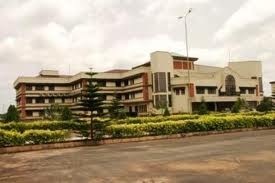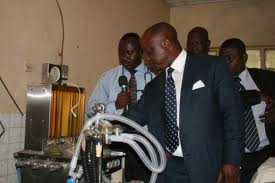
 It is a well-known fact that happiness and prosperity are strongly tied to sound health. This is because a person that is not healthy cannot be said to be happy and an unhealthy person can likewise not be said to be prosperous since prosperity comes from productivity. It is against this backdrop that the Delta State Government through the Ministry of Health decided to introduce several people-oriented health programmes aimed at not just reducing the disease burden of Deltans but ensuring that the death rates resulting from sickness and disease are brought to their barest minimum.
It is a well-known fact that happiness and prosperity are strongly tied to sound health. This is because a person that is not healthy cannot be said to be happy and an unhealthy person can likewise not be said to be prosperous since prosperity comes from productivity. It is against this backdrop that the Delta State Government through the Ministry of Health decided to introduce several people-oriented health programmes aimed at not just reducing the disease burden of Deltans but ensuring that the death rates resulting from sickness and disease are brought to their barest minimum.
One of the ways the government has been achieving these grand objectives is through the effective implementation of the free maternal programme. Launched since November 17, 2007, the programme provides free ante natal services, laboratory investigations and drugs right from conception to six weeks after delivery, inclusive of ceasarian section. The idea is predicated on Millennium Development Goal No. 5 that is targeted at reducing deaths resulting from pregnancy and child birth to 75 per 100,000 live births by 2015.
The position in Nigeria has continued to be alarming at about 800 per 100,000 deliveries. However, a survey carried out by the UNFPA in 2005 put the maternal death rate in Delta State at 456 per 100,000 live births, while another done three years later (2008) by the National Demographic and Health Survey showed that the maternal death rate was 545 per 100,000 live births.
These figures, though, not as high as the national average of about 800, were still unacceptable to the Government of Dr Emmanuel Uduaghan, hence the vigorous efforts to reduce maternal deaths. Structures like the engagement of extra doctors specifically for the free maternal and construction of special clinics were put in place. All the necessary logistics were also not left out. Besides, women and parents generally have since keyed into this laudable scheme and are ever grateful to the State Governor for the wonderful gesture. The outcome today is that the maternal death rate in the State has reduced by more than half from 545 in 2008 to 261 in mid-2011. Even at that, state hospitals’ authorities are the view that the reduction could have been much lower if poorly managed cases had been brought to government hospitals on time, particularly those of emclasia, a condition of persistent but increasing high blood pressure that sometimes accompanies first pregnancy.
As at mid-2011, over 150,000 women have benefited from the free maternal programme. However significant this feat may be, what is more paramount to the state commissioner for health, Dr Joseph Otumara, is to further reduce the maternal death figure to 150 by 2013 and eventually to 75 by 2015. A major impediment to achieving these targets, according to the commissioner, is when pregnant and expectant mothers patronize quacks and allow their cases to be mismanaged. ‘There is no reason why any woman should go to traditional birth attendants when the state is giving them free and qualitative services’, the commissioner queried, adding: ‘we have put in place a lot of structures and we are well able to reduce maternal mortality rate to two digits by 2015.’
With the structures and achievements on ground so far in enhancing maternal health, it is obvious that Delta is very much on course to meeting the health related MDG targets. The snag, if any, is that the State does not blow its own trumpet despite being the foremost in the country in terms of having a comprehensive maternal health package that is not only free and qualitative but also accessible to Deltans. This is evident in the unparalleled 65 hospitals that the State manages and spread across the 25 LGAs, out of which six have been upgraded to a central status, acting as referrals to the general hospitals. This is outside the teaching hospital in Oghara, with state-of-the-art facilities, Magnetic resonance Imaging (MRI), CT Scan, Fluoroscopy, ECG, Ultrasound and Angiographic studies. This is without doubt why the teaching hospital coupled with seasoned personnel, is grouped among the few best in Africa. In addition, the state boasts of 446 functional primary healthcare centres (PHCs) which far exceeds the national and WHO recommended number of 225, considering the State’s land mass and the one PHC for every five kilometre radius target.
 A conducive health structure and package of this magnitude is certainly the envy of all. This is why it is no longer news that even indigenes of neighbouring states and elsewhere cross borders on daily basis to benefit from the state’s big-hearted disposition towards healthcare delivery. Sometime in the recent past, there was a case of a woman of Taraba extraction who relocated temporarily to Delta because of the need to have her baby delivered free through caesarian section. Cases of this nature are commonplace but for the State Government, any sacrifice to reduce the maternal mortality rate in the State will not be too much to bear. On how the State Government hopes to tackle non-Deltans infiltrating the scheme, Dr Otumara said, ‘We do not see the need to start screening beneficiaries of the scheme to eliminate non-Deltans because that measure would end up creating bottlenecks that would defeat the very essence of the programme to drastically cut down maternal mortality rate in the state.’
A conducive health structure and package of this magnitude is certainly the envy of all. This is why it is no longer news that even indigenes of neighbouring states and elsewhere cross borders on daily basis to benefit from the state’s big-hearted disposition towards healthcare delivery. Sometime in the recent past, there was a case of a woman of Taraba extraction who relocated temporarily to Delta because of the need to have her baby delivered free through caesarian section. Cases of this nature are commonplace but for the State Government, any sacrifice to reduce the maternal mortality rate in the State will not be too much to bear. On how the State Government hopes to tackle non-Deltans infiltrating the scheme, Dr Otumara said, ‘We do not see the need to start screening beneficiaries of the scheme to eliminate non-Deltans because that measure would end up creating bottlenecks that would defeat the very essence of the programme to drastically cut down maternal mortality rate in the state.’
Just as the fight to combat challenges facing maternal health is vital to the State Government, so also is that of children from age zero to five years. The importance attached to the survival of this group of individuals who represents the future generation, made Governor Uduaghan to launch a free healthcare scheme for them on May Day in 2010 at the Central Hospital, Sapele. This initiative by the Government was hinged on the need to meet MDG No 5 which targets reduction in child mortality. A United Nations report in 2005 indicates that death rates in children under age five are dropping but not fast enough particularly in Sub-Saharan Africa. The report says 11million children a year-30,000 a day-die from preventable or treatable causes. The report added that most of these lives could be saved by expanding programmes that promote simple, low cost solutions. Like maternal, child mortality is closely linked to poverty. The state governor understands too well these relationships which propelled him to key into the UN policy of expanding programmes that would provide simple, low-cost solutions. Today, the free medical services for children below five years of age are real in Delta State. When it was first launched cynics saw it as a dream too tall and certain to be abandoned but because of the success of the programme over time, others have started replicating it in their State.
The beauty of the Delta State package is that it is comprehensive. The reasoning of the Government is that if parents cannot afford to pay for treatment and drugs because they are poor, they would certainly not be able to pay for surgeries. Hence, the programme covers treatment, drugs, laboratory investigations and surgeries free-of-charge.
Providing the logistics for the effective implementation of the under-five programme like that of free maternal has been less of a challenge. What is worrisome unfortunately is enforcing compliance by medical and health personnel, some of whom are bent on sabotaging government’s effort through sundry sharp practice and outright dereliction of duty. This accounts for why the health commissioner, Dr Otumara has continued to pay unscheduled visits to State Hospitals to ensure that Deltans and non Deltans alike get the desired benefits of the programme. His dogged approach has to a great extent brought sanity in terms of compliance and service delivery.
About two years after the free under-five was launched, the embarrassing story of child mortality rate has changed for the better. How? In 2008, just over three years ago, the death rate in Nigeria in a study carried out by the National Demographic and Health Survey put the under-five mortality rate at 157 per 1000 live births and 138 per 1000 for the South-South states. The result of this survey is similar to an early one in 2007 done by UNICEF that put the national death rate at 138/1000 and that of the South-South states at 111 per 1000.
From all indications, the death rates are relatively lower in the South-South when compared with the national figures. But this did not in any way make the Government of Delta State to rest on its oars. This is so because hospital data between June 2010 and May 2011 put the death rate at 17.2 per 1000 for under-five children in Delta State. This is a very significant achievement in just one year. In fact, since the launch of the free under-five medicare in Delta State, it has been steady progress in meeting the MDG target of one digit death rate for children, akin to what is obtainable in advanced countries. This is a feat Dr Otumara described as the index for measuring development and standard of living. According to him, the death rates determine how civilised and advanced a country is in the comity of nations, saying that one thing paramount that the state government owes the people of Delta is joy and happiness, stressing that it is delivering on this obligation through its many health packages.
This is probably why the health sector in Delta State is seen in many quarters as a major pillar supporting the human capital content of the three-point agenda of the present administration, largely due to the fact that its health policy and programmes are aimed at touching the lives of the people directly. Of particular reference in this case is the Free Rural Health Scheme. Designed as an interventionist aid to meet the many health care needs of Deltans, especially those in the rural areas of the hinterlands and riverine communities, the scheme started in 2005.
The broad objective of the scheme is to effectively bridge the socio-economic barriers to getting curative, primary and secondary healthcare to the doorsteps of residents of Delta free-of-charge. One interesting feature about the scheme is that it covers all ages: the infant, the young, the old, men and women alike with diverse ailments and health conditions.
The scheme is also unique to Delta State for now. Some states like Ondo that intends to replicate it are still planning seven years after it became a reality in Delta, and has expanded severally over the years, all because of the need to give more satisfaction to Deltans and other beneficiaries. For instance, in 2005 and 2006, the scheme provided medical services, drugs and laboratory investigations, while in 2008, surgical services were introduced. The 2011 edition witnessed further expansion with the inclusion of immunization of children and dental care.
The achievements of the free rural health scheme have continued to be astounding. Since 2008, over 78,000 persons have benefited. In 2008 alone, 19,974 persons from 93 communities across the 25 LGAs, while in 2009, 101 communities were visited with 19,567 persons benefiting. In 2010, 74 communities were covered and 14, 879 persons benefited while that of 2011covered 100 communities with 24,194 persons benefiting.
Also, during the period under review (2008-2011), a total of 365 visits were made to different communities in the 25 Local Government Areas. The number of patients attended to was 78,614, while 3,678 surgical operations were done. A breakdown of the surgical operations indicated that 1,234 patients were for general surgery such as hernia, hydrocele, lipoma, renal cyst and appendicitis; 298 for gynaecological cases such as uterine fibroid and ovarian cyst, while 2,143 were for ophthalmologic conditions such as removal of cataract, excision of pterygia, lens repositioning and conjunctiva mass excision, among others.
Just to mention a few, let us recall the case of Master Sunday Ifekam from Obiloh in Ukwuani Local Government Area who had an advanced renal cyst operated on successfully. He could not continue schooling and was even derided for being a wizard carrying a woman’s pregnancy in the protruded abdomen. One year after the operation, Sunday Ifekam is hale and hearty and has since started schooling.
Even the likes of the Eleberis from Emuhu town near Agbor are not left out where four members of the family got their sight restored. If the head of the family, 84 years old Pa Raphael Eleberi and his cousin, Mrs Josephine Usikpo (78 years) were just happy to have regained their sight, that of Pa Raphael’s children, Kingsley and Lovelyn is certainly more; having been unable to school beyond the primary level or engage in any trade because of vision impediment, they now are opportune to either continue their education or learn a trade that would guarantee a bright future for them.
In the area of obstetrics and gynaecology, the likes of Folashade Adeola who hails from Ekiti State but resides in Warri, benefited from the removal of multiple fibroid from the uterus. Like the saying goes, where babies will not go, fibroid will take over, but for the hundreds of beneficiaries looking forward to the fruit of the womb who had fibroid or ovarian cyst operation done for them, it is not just a case of relief from pain and monetary cost of operation but now of hope to bear children.
Looking back at the feats of the free rural health scheme, one can see that it has over the years been a source of relief to thousands of persons in and outside the State. Those suffering from either partial or complete blindness have had their sight restored; those with health conditions requiring general or obstetrics and gynaecology intervention were all operated on successfully. Medications and necessary health counselling were given to many others with health conditions such as malaria, hypertension, and arthritis, among others. The import of this is that the sickness and disease burden have been reduced greatly over time among the people, especially those in the rural areas. This, in essence, means that their productive capacities have been boosted, thus, making them to be self-reliant.
No doubt, the three free medical services of the state government have proved to be veritable sources of direct dividends of democracy to the people, particularly the poor and rural populace. Beneficiaries of these programmes and other stakeholders have of course acknowledged that the health sector in the state has performed creditably. But for the Ministry of Health, and indeed, the State Government, no sacrifice will be too much to ensure that the health of its citizenry is safeguarded at all times.
 * Contributed By Churchill Oyowe, a Public Relations Officer @ Delta Ministry of Health in Asaba
* Contributed By Churchill Oyowe, a Public Relations Officer @ Delta Ministry of Health in Asaba












Great post! It always amaze me how people can take time to write them. But to be honest maybe you should change the color of the texts? Sorry if I am being rude, just trying to help. Kind regards, Sophia
Yes indeed, sometimes the health budget is overlooked by the authority. How sad to hear many poor people died without trying their best to save their love ones life. I remembered once that other hospitals in some other countries will not accept hospitalization if they can’t give any downpayment. They have to go first to some non-profit organization that can help them. How ironic it is, we pay taxes but here comes the other good people first in rescue.